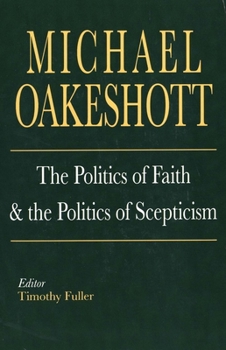The Politics of Faith and the Politics of Scepticism
Select Format
Select Condition 
Book Overview
In this carefully reasoned work, discovered after Michael Oakeshott's death in 1990 and here published for the first time, the preeminent political philosopher describes the fundamental dichotomy that has divided discussion of the role of government in Europe since the Renaissance. Oakeshott exposes the weaknesses of each opposing position and proposes a middle ground, incorporating some scepticism and some faith. "By general consensus, Oakeshott is the most striking and original British political thinker of the century. . . . Anyone interested in the nature of politics and government will find this book of interest, and many will want to direct their senior students to it as an accessible introduction to Oakeshott's thought."-William Christian, University of Guelph, Perspectives on Political Science "The Politics of Faith and the Politics of Scepticism is concerned to trace the deepest and most permanent features of the modern European political landscape over the last five hundred years, and this it does in an original, insightful, and frequently eloquent manner. We are fortunate that the book has finally seen the light of day."-Paul Franco, Bowdoin College, Political Theory "We are grateful to the editor Tim Fuller for making available this little gem that combines philosophical insight and historical investigation in the exposure of the two 'styles' of modern European politics, without the elaborate prose to which Oakeshott has accustomed his readers: the absence of the typical flamboyant style that characterizes Oakeshott's published works, enables us to grasp his line of thought in the making and renders his arguments crystal clear. . . . A sublime mememto."-Giovanni Giorgini, Political Studies
Format:Paperback
Language:English
ISBN:0300105339
ISBN13:9780300105339
Release Date:May 1996
Publisher:Yale University Press
Length:160 Pages
Weight:0.60 lbs.
Dimensions:0.4" x 6.0" x 9.0"
Customer Reviews
1 rating
The role of conversation in politics
Published by Thriftbooks.com User , 25 years ago
One of Michael Oakeshott's essays is entitled "The role of poetry in the converstaion of mankind". This posthumously published book is about the role of conversation in politics. Or rather, about politics understood not as a crude excercise of power or an instrumentally rationalistic pusuit of pre-given interests, but as a conversation between two extremes or "ideal types", i.e. "the politics of faith" and "the politics of scepticism". On the one hand, these two extremes are the only thing that can be KNOWN about European politcs with certainty that can aspire for the title of Science. The rest is left to judgement. But this knowledge, in turn, is of a particular kind, since extremes never (or rarely) reveal themselves in their pure form and can be again only "imagined". "Imagined" for Oakeshott means "experienced", not in a way empiricists fancy we experience the world "out there", but reconstructed from the only raw material that is available in the world of ideas - language. While trying to grasp its ambiguity (that comes along with the ambivalence of political action and human conduct in general), Oakeshott not only helps to understand the complex phenomenon of European politics but makes his reader to live through, as it were, revolutionary thrusts of "the politics of faith" and maddening indecicivenss of "the politics of scepticism"; thus making a point not for a fixed "golden mean" between the two, but the "mean in action", historically and culturally specific condition that can be achieved only through moderation based in turn on a willingness to lay down any claims for the possesion of ultimate truth and therefore ultimate knowledge with regards to the goal towards which a society should be oriented.





